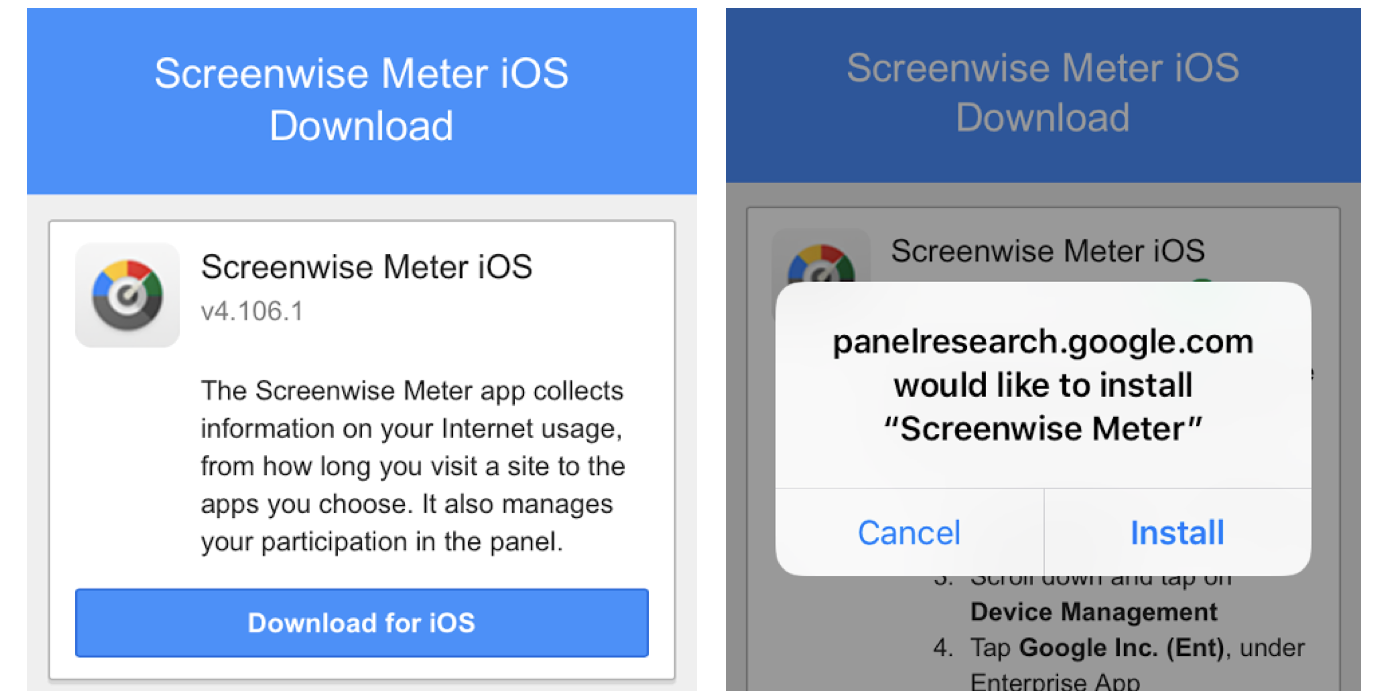It looks like Facebook is not the only one abusing Apple’s system for distributing employee-only apps to sidestep the App Store and collect extensive data on users. Google has been running an app called Screenwise Meter, which bears a strong resemblance to the app distributed by Facebook Research that has now been barred by Apple, TechCrunch has learned.
In its app, Google invites users aged 18 and up (or 13 if part of a family group) to download the app by way of a special code and registration process using an Enterprise Certificate. That’s the same type of policy violation that led Apple to shut down Facebook’s similar Research VPN iOS app, which had the knock-on effect of also disabling usage of Facebook’s legitimate employee-only apps — which run on the same Facebook Enterprise Certificate — and making Facebook look very iffy in the process.

Google’s Screenwise Meter app for iPhones. (Images: Google)
First launched in 2012, Screenwise lets users earn gift cards for sideloading an Enterprise Certificate-based VPN app that allows Google to monitor and analyze their traffic and data. Google has rebranded the program as part of the Cross Media Panel and Google Opinion Rewards programs that reward users for installing tracking systems on their mobile phone, PC web browser, router, and TV. In fact, Google actually sends participants a special router that it can monitor.
Originally, Screenwise was open to users as young as 13, just like Facebook’s Research app that’s now been shut down on iOS but remains on Android. Now, according to the site’s Panelist Eligibility rules, Google requires the primary users of its Opinion Rewards to be 18 or older, but still allows secondary panelists as young as 13 in the same household to join the program and have their devices tracked, as demonstrated in this video here (which was created in August of last year, underscoring that the program is still active):
Unlike Facebook, Google is much more upfront about how its research data collection programs work, what’s collected, and that it’s directly involved. It also gives users the option of “guest mode” for when they don’t want traffic monitored, or someone younger than 13 is using the device.
Putting the not-insignificant issues of privacy aside — in short, many people lured by financial rewards may not fully take in what it means to have a company fully monitoring all your screen-based activity — and the implications of what extent tech businesses are willing to go to to amass more data about users to get an edge on competitors, Google Screenwise Meter for iOS appears to violate Apple’s policy.
This states, in essence, that the Enterprise Certificate program for distributing apps without the App Store or Apple’s oversight is only for internal employee-only apps.
Google walks users through how to install the Enterprise Certificate and VPN on their phone. Developers seeking to do external testing on iOS are supposed to use the TestFlight system that sees apps reviewed and limits their distribution to 10,000 people.
We have reached out both to Apple and Google for a comment on why this app is either the same, or different to the app Facebook had been distributing.
If Apple considers this a violation of its Enterprise Certificate policy, it could shut down Screenwise’s ability to run on iOS. And if it truly wanted to punish Google like it did Facebook, it could invalidate the certifications for all of Google’s legitimate apps that run using the same certificate.
That could throw a wrench into Google’s product development and daily work flow that could be more damaging than just removing one way it gathers competitive intelligence.
We’ll update this post as we learn more.
Comments
Post a Comment